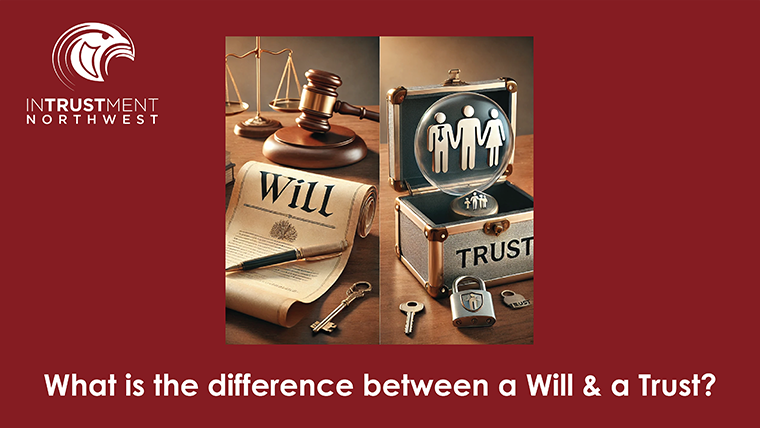Understanding the Key Differences Between a Will and a Living Trust
Estate planning is a crucial step in ensuring that your assets are managed and distributed according to your wishes, both during your lifetime and after your passing. At Intrustment Northwest, we often receive questions about the differences between a Will and a Living Trust, two essential tools in the estate planning process. Understanding these differences is vital in making informed decisions that best suit your needs and those of your loved ones.
The Basics: What is a Will?
A Will is a legal document that outlines how your assets and property should be distributed after your death. It is a straightforward way to ensure your wishes are honored, and it allows you to designate guardians for minor children. However, it’s important to note that a Will only takes effect after you pass away. It does not provide any management of your assets during your lifetime or in the event of incapacitation.
Introducing the Living Trust
A Living Trust, also known as a Revocable Living Trust, is a more dynamic estate planning tool. It holds ownership of your assets during your lifetime, allowing for seamless management and distribution both while you’re alive and after your death. Unlike a Will, a Living Trust takes effect immediately upon creation and can help manage your assets in the event of incapacitation.
Avoiding Probate: A Key Advantage of a Living Trust
One of the most significant differences between a Will and a Living Trust is how they interact with the probate process. A Will must go through probate, a court-supervised procedure that can be time-consuming, costly, and public. During probate, the Will is validated, debts are paid, and assets are distributed according to the Will’s instructions.
In contrast, a Living Trust bypasses probate entirely. Because the trust owns the assets, they can be transferred to beneficiaries without court involvement. This not only speeds up the distribution process but also keeps your estate details private, away from public records.
Privacy and Control: Keeping Your Affairs Confidential
Privacy is another area where a Living Trust holds an advantage. Since Wills become public record once they enter probate, anyone can access the details of your estate and beneficiaries. A Living Trust, on the other hand, remains private, with no public disclosure of your assets or who inherits them.
A Living Trust also offers greater control during your lifetime. As the grantor, you can act as the trustee or appoint a successor trustee, allowing for continued management of your assets in line with your wishes. This is particularly beneficial if you become incapacitated, as the trust ensures your assets are managed without the need for court-appointed guardianship.
Costs and Complexity: Weighing the Options
Wills are typically simpler and less expensive to create, making them a popular choice for straightforward estate plans. However, the probate process can add costs and complications later on. On the other hand, a Living Trust requires a more significant upfront investment in terms of time and money, but it can save your estate and beneficiaries from the potential costs and delays associated with probate.
Complementary Tools: Using Both a Will and a Living Trust
Many people find that using both a Will and a Living Trust offers the most comprehensive estate plan. A Living Trust can effectively manage and distribute the majority of your assets, while a Will is essential for appointing guardians for minor children and handling any assets not included in the Trust.
At Intrustment Northwest, we’re dedicated to helping you navigate these decisions with confidence. By understanding the differences between a Will and a Living Trust, you can take the necessary steps to protect your legacy and provide for your loved ones in the most efficient and effective way possible.
If you’re ready to explore your estate planning options or have questions about Wills, Trusts, or other estate planning tools, our team at Intrustment Northwest is here to assist you. Contact us today to learn more about how we can help secure your future.
www.intrustmentnw.com | 360.694.5177 | marketing@intrustmentnw.com

